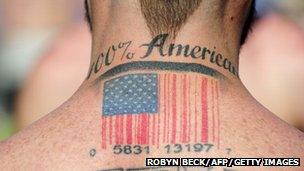Barcode birthday: 60 years since patent
- Published

The barcode has also become popular body art
There are now more than five million individual barcodes in use around the world, according to regulator GS1 UK.
Sunday, 7 October is the 60th anniversary of the barcode patent, filed in the US in 1952.
However the distinctive black-and-white stripes did not make their first appearance in an American shop until 1974 - because the laser technology used to read them did not exist.
GS1 said the QR code was not a threat to the traditional linear barcode.
A QR (Quick Response) code is an image made up of dots, which can contain more data than a barcode.
"They have different purposes - the barcode on the side of a tin of beans is for point-of-sale scanning. It ensures the consumer is charged the right amount and updates stock records," said Gary Lynch, chief executive of GS1 UK.
"The QR code's main purpose is to take the person that scans it to an extended multi media environment. Technically you can combine the two but nobody's asking for that right now."
The first item to be scanned by a barcode was a packet of chewing gum in an Ohio supermarket in 1974.
But the black-and-white stripes did not get a universal welcome, with some wine manufacturers refusing to incorporate barcodes onto their labels for aesthetic reasons.
Now it occasionally doubles as body art, with US singer Pink among those who sport a barcode tattoo.
"Barcodes are an icon and rightly so - we're quite pleased about it," said Mr Lynch.
"But if one of my daughters had one in homage to her father I'd be rather upset."
- Published18 September 2012